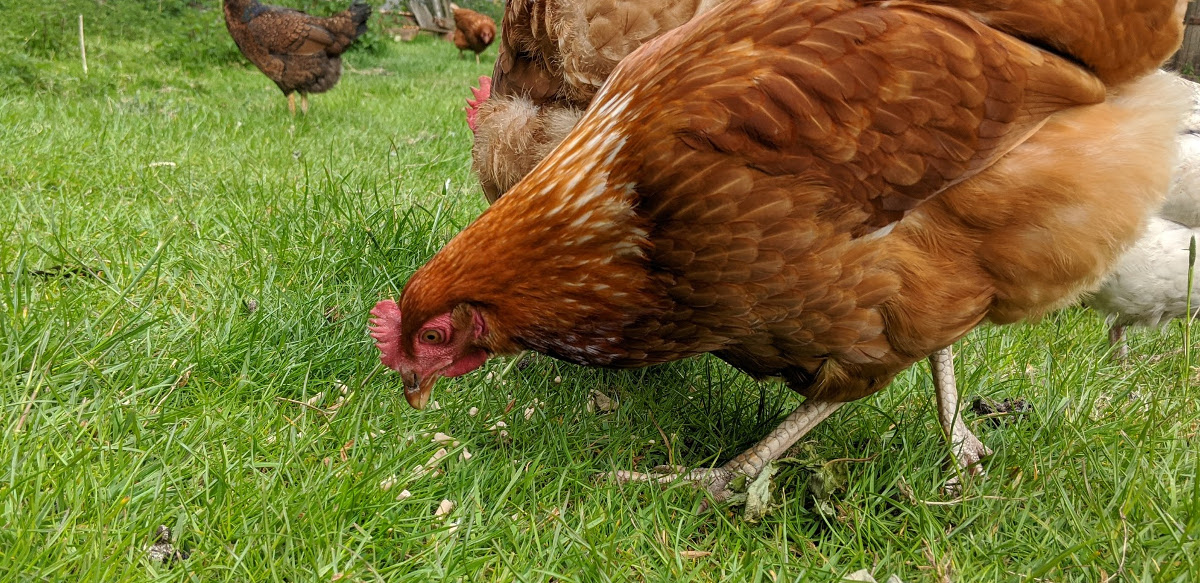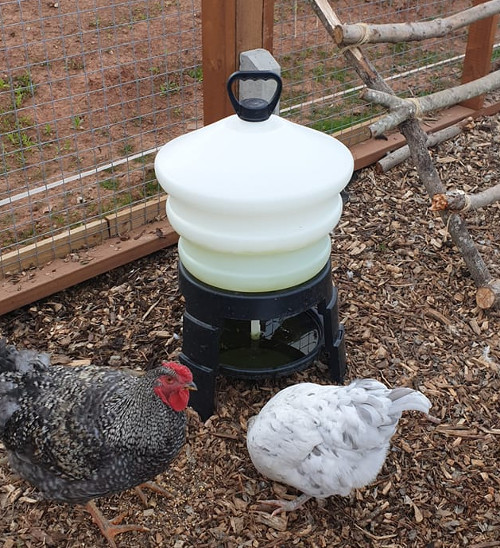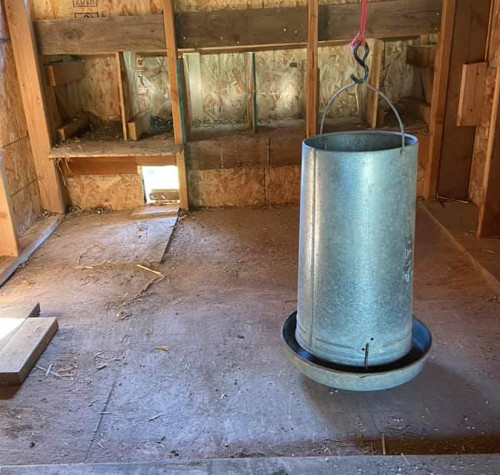Should you put food and water in the chicken coop?

There has been much debate raging over the years about whether it’s better to feed and water chickens inside the coop or outdoors in the run. I know keepers who do it all the time and some that never do, others like me make exceptions when the weather is really bad or cold.
You should feed your chickens outside in the run or on the range if you can, only resort to feeding inside the chicken coop if you have no other alternative.
As a little backstory on this, Ronnie, the old man who taught me everything I know about chicken keeping would probably have taken me outside and flogged me if he had caught me leaving food and water in the run unless there was snow on the ground but even then there was no food or water inside overnight.
Below: Water should never be in the chicken coop unless it is freezing quickly. Spills are no problems outside but in the hen house dampness is a real issue.

His reasoning was that if the chickens were inside for any longer than they needed to be then they were making a mess of the bedding on the floor and not busying themselves looking for food outside. Chickens inside the coop may also end up more likely to eat eggs, just because of the way they scratch around.
He was a complete traditionalist, sleeping and laying was all that happened inside.
The right answer depends on many things, such as coop and flock size and whether or not the chickens are confined in a run and for how long and what the weather is like.
Should you feed chickens in the coop or outside in the run?
When it comes to their daily feed ration it should always be outside of the coop but it can be in the run. They may be many reasons you need to keep the food under cover, it stops the wild birds helping themselves and keeps it dry and mould free.
My chickens have an open coop leading to a secure run. I make exceptions in bad or snowy weather when I do feed inside but otherwise they are never fed in the coop and nothing is in there overnight.
If you have free range birds then you will be letting them out in the morning so it shouldn't be an issue but if your birds are regularly up before you then consider an automatic coop door opener. I have several and they make mornings easy.
It could end up getting cramped if the food and water is in the coop.
Do you put food and water in chicken coop at night?
No. This is a clear and simple answer. Chickens do not eat and drink overnight, from the moment they go to sleep on the roost to the moment they land on the floor in the morning they rely on fed stored in the crop.
Reasons not to put food and water in the chicken coop:
- Water in the coop causes damp, mould and fungi like aspergillosis. It will also rot wood and rust metal in no time at all.
- Feed can spoil and grow mould. Some toxins produced by moulds are fatal to chickens ans spores can get in the lungs.
- The mess. Chickens should be out of the coop as much as possible, you will need to clean much more often if the flock is indoors.
- Vermin. Rats and mice do tremendous damage and bring disease and other pests.
- Spilled, wasted food in the coop.
Whether or not to leave food and water in the coop overnight is a common question that has sparked a lot of lively debate over the years but it really is pointless. I am not a fan of leaving feed lying around as it brings in vermin which will damage the house trying to get in. There is also the problem of spoilage or dampness.
Even when the weather is bad and I feed my chickens inside I still remove all the feed before they roost for the night. I never leave anything lying around that could attract visitors.
Can chickens go all night without food and water?
Chickens can easily go all night without food and water. Chickens never eat during hours of darkness. The coop is for sleeping and laying and anything else they need should be provided in their run or outside.
Having feed and water in the hen house encourages traffic in and out of the coop with more fouling of the bedding than necessary and increasing your maintenance and cleaning load. Spilled food and water adds to the mess.
You could end up with having a horrible time with mould, spilled food, fighting and bullying in the coops.
When I kept the food in the run, in a hanging feeder, the hens would still spill it and then if it got wet due to weather, then it would rot and stink! So I had to regularly scrape it off the ground, which is a pain.
I know some people feed inside to try to keep wild birds from eating the chicken feed or to keep it out if the rain. Feeding outside of the chicken coop helps keep rodents out of the coop.
Some people have them in the coop, some in the run, and some in both places. There is no one right place that works for everyone while any other choice is wrong. They all can work. Your management techniques have a bit to do with what is best for you, also your weather and coop size.
Multiple food and water stations helps with chicken integration, giving the younger ones a place to go for food and water so they don’t have to challenge the older chickens.
If you do feed and water inside the chicken coop use these special measures:
If you do feed inside the coop then hand the feeder a few inches off the floor so the hens can't scratch the feed out of it and buy one with a large lip on the edge to help prevent spillage.
Below: A feeding with a large lipped edge hung above the floor.

If you provide water inside the coop make use of a narrow necked drinker that is well attached and not able to be knocked over.
Should you keep or store chicken feed in the coop?
Chicken fed needs to be stored in a container that won't allow rats or vermin to get at it. as long as this is the case it doesn't matter where you keep the feed container.
Conclusion:
A waterer inside the coop provides easy access for the first drink of the morning and also makes it easier to keep it from freezing in cold weather. On the down side, drips and spills that dampen bedding require a greater degree of litter management. The smaller the coop and the more chickens you have compound the problems.
The benefits of feeders inside the coop is that the feed remains dry in inclement the weather and it encourages the chickens to come indoors at nightfall to grab a snack before going to roost.
Feeders outside the coop encourages the flock to spend more time free ranging, enjoying the outdoors and sunshine. It frees up more space inside the coop for the chickens as overcrowding can be problematic.
There is somewhat of a tenancy for over protective keepers to treat chickens like their family and expect them to behave in the same way.
A hen house isn't a family home and is first and foremost a safe secure roost. Chickens don't need lounges and kitchens, just roosts and nest boxes.
You could end up creating a rat problem for yourself which you will have to deal with.
Drinkers outside in the run encourages more outdoor activity and also makes more room inside the coop for chickens.
